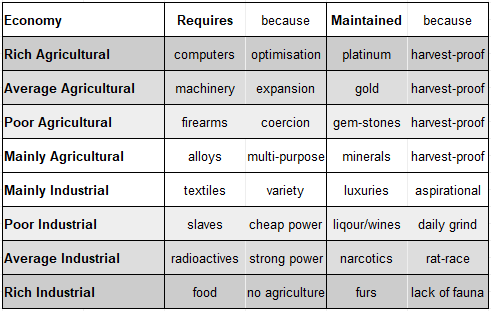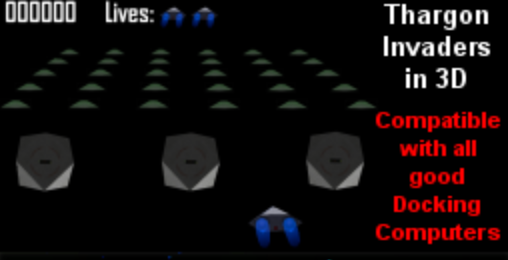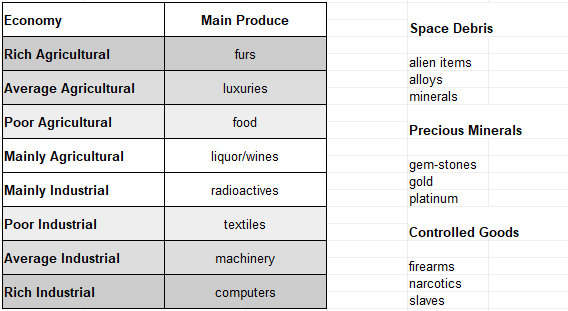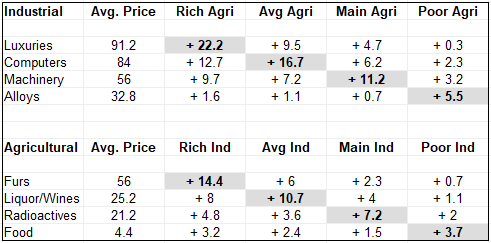Most players are familiar with the furs to industrial, computers to agricultural monotony but at least it's simple.
We know what agricultural means (they love their computers) and we know what industrial means (even on a tropical hotspot inhabited by rodents they go crazy for furs). Currently Industrial/Agricultural determines which one you buy, while rich/poor/etc. determines optimisation.
It kinda works, it's just very samey.
When trying to shake thinks up it's easy to make things (much) more complex for little benefit.
So what is the player experience of trading?
Buying goods at a known price to sell elsewhere at a (usually) unknown price in the hopes of making a significant profit.
So the player's experience is largely that of trying to predict demand rather than supply.
Demand is the unknown and is therefore of the most interest to the player.
Currently demand is both:
- consistently predictable
- consistently the same
Only one of the above is useful from a gameplay perspective.
Predictability makes the profit reliable. Too much risk and a hard fought journey to the station is rewarded only with disappointment. There is already risk, it's just provided by the pirates.
Shipping the same two goods however is dull as dishwater, Rather than scooping something and thinking, "I know where to sell that to make a nice profit!", we're more often thinking in similar manner to pirate's collecting their ransom only to discover food. Sure, it's nice to feel you've occasionally scooped something really valuable but when you're more often ejecting it back out again, that's encouraging player's to be 'spoilt'.
So, I'm suggesting keeping the predictability: the player knows that any industrial produce will sell for a profit in any agricultural sysytem and vice versa.
But I'm also suggesting varying the demand and not the supply
That way the player's present system does not restrict their choice of destination any more than it already does, i.e. I'm in an agricultural system, what's nearby in the way of industrial systems as I know I can make a profit there?
However, instead of looking for the optimal poor agricultural to rich industrial milk-run (again: samey), the player can either buy X and therefore head to Y or, much more conveniently, decide they're heading to Y and therefore buy X. This is much harder to do if making both supply and demand more variable.
So what of the demands?
Rationale for 16 different goods spread over 8 economy types leaving one good left: alien items - hike the price and let non human's sell it in small ammounts

I could explain each one in detail but, crudely (and desirably simplistically - no claims to be an expert in any of this)...
Poor economies would be about establishing themselves, rich ones stabilising themselves.
e.g. a rich agriculture is already booming but advanced computers help it to predict and compensate against poor weather and other variables.
Platinum investment, meanwhile, offers some proof against particularly poor harvests, and the rich are inclined to insure themselves.
Mainly's would be about complimenting what they already have.
e.g. mainly industrials already have some agriculture and, being industrialised have long exploited native textiles with this presenting a stable export, however (being more balanced and less needy than some other systems) impotring non-native textiles enables them to further exploit their expertise. Luxuries are desirable everywhere but 'mainlys' are likely to combine have an inability to supply/manufacture them with a sufficiently balanced and stable (mainlys should arguably be the most independant systems) existence to appreciate them.
Industrial/Agricultural would be much as it is, it would just be that the profit is higher or lower depending on the rest.
I don't know how to programme almost any of this yet but I think I might be onto something with the supply/demand distinction.
The player would be no more likely to be 'bottle-necked' than with the current model, they'd just be encouraged to think more about their purchases.
Which variety of industrial/agricultural was within jump range needn't restrict your ability to trade, rather it would guide your choice of goods to ship and crucially needn't limit them.
And yes, I'm aware that pricing and availability would need tweaking but two different 'desirables' per economy type helps with that.
It's still fairly fresh in my mind and, as usual, I may not have explained myself adequately so thoughts and questions welcomed.



